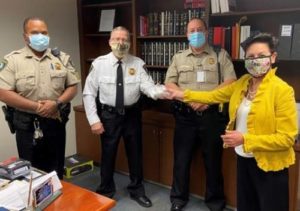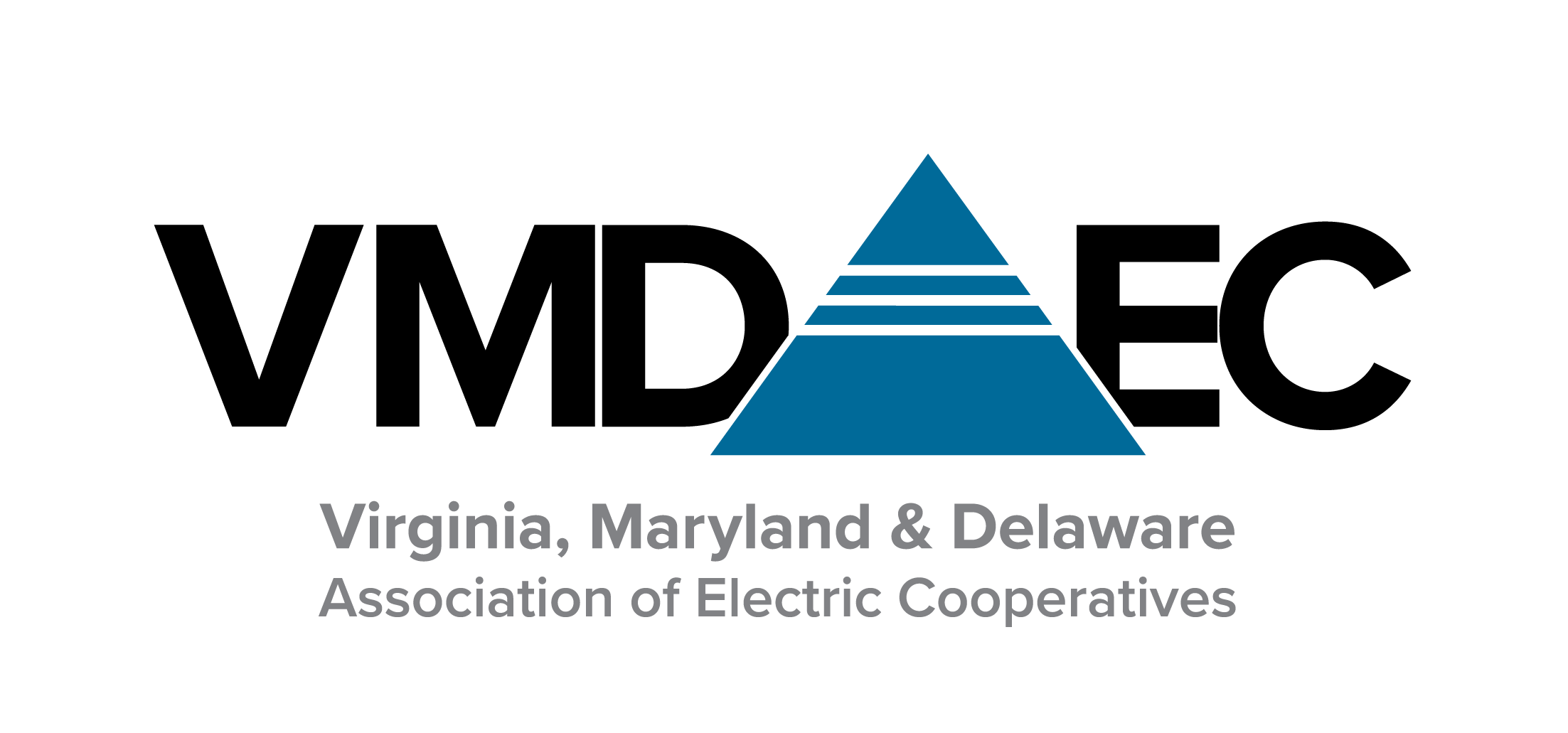While COVID-19 may be receiving the majority of the attention this year, 2020 could easily be called the Year of the Cooperative. For several decades, the nation’s electric co-ops have been faced with and overcome adversity.

SEC Communications Specialist Jennifer Wall drops off hand sanitizer for the Prince Edward County Sheriff’s Department.
Our co-ops in Virginia, Maryland and Delaware have met many challenges related to severe weather over the years. The typical crisis usually includes rain, snow, wind or ice and widespread power outages. The culprit this year was an unprecedented pandemic causing financial and emotional hardship on co-op members and employees. The co-ops were prepared.
Most lobbies are closed to the public, and many co-op employees are working remotely from home. Conveniences implemented by several co-ops, such as online account management and payment kiosks, have proven their worth.
Crews in the field have adapted well to new social distancing requirements, while virtual meetings have replaced the conference rooms.
“The work that was done by our IT department to get our member services representatives and other office employees who have adequate internet access at home the ability to work remotely will benefit the cooperative well beyond this pandemic,” said Melissa Gay, communications and member services manager for Central Virginia Electric Cooperative, based in Arrington.
“The ability to work remotely during future widespread outages will increase how responsive we can be to members’ needs and increase our workforce in the event roads are impassable and office personnel cannot report to the actual office building,” she said.
Many of CVEC’s employees may work remotely through August. The co-op is also currently researching ways to host a virtual Member Advisory Council meeting and continues to add internet hot spots throughout its service area to better serve members.
Rappahannock Electric Cooperative revised its disaster recovery plan several years ago to include a pandemic response. REC Director of Communications and Public Relations Casey Hollins said, “Each year, we practice a disaster simulation so that ability to activate the plans remains fresh in everyone’s mind and so we can make adjustments as needed.”
REC formed a pandemic response team that meets frequently, provides regular updates and collectively anticipates upcoming needs. “Having that dedicated team of leaders focused on the pandemic really allowed us to achieve some of the success we were able to experience amid the frequently changing conditions,” Hollins added.
Other co-ops, such as Northern Virginia Electric Cooperative (NOVEC), are also making modifications to their crisis communication plans. “We’ve added a number of COVID-19-related topics,” said Lisa Hooker, vice president of public relations.
NOVEC’s internal theme of “In This Together,” reflects the family atmosphere within electric co-ops. “It reminds us that we’re still working together as one to maintain reliable electric service for our customers, even as we’re relocated among several offices and teleworking,” Hooker said.
A weekly email is designed to provide useful information and uplift employees during this stressful time. Topics have included tips for grocery shopping safely, cooking, fitness, managing anxiety, housecleaning, and online learning. NOVEC’s ramped-up employee communication also utilizes its intranet and digital signage in common areas.
A&N Electric Cooperative’s service area has been one of the most hard-hit in Virginia because of issues at poultry facilities. Accomack County has the highest per capita COVID-19 case rate in Virginia.
Recognizing the unique challenges for its employees and members, ANEC has implemented its plan to follow Centers for Disease Control guidelines on protecting its employees and their family members while being able to respond quickly in cases of power outages.
“We are very fortunate that our employees and their families have had little to no issues as it relates to the COVID-19 outbreak here on the shore,” said Butch Williamson, president and CEO. “Our response by all of our A&N employees has been the best yet, and they did not miss a beat as we continued to provide normal essential services. Our outage response center remains open 24/7 for reporting, and crews are on standby, ready to respond if or when the need occurs.”
Southside Electric Cooperative has enhanced its focus on community. “In adherence to SEC’s mission to enhance the quality of life of the communities served, the cooperative has focused on community contributions in order that area citizens receive much-needed support,” says SEC Director of Community Relations Lloyd Lenhart.
SEC has contributed to area schools to help fund meal programs and the purchasing of books, donated to various food banks and distributed more than 1,000 vials of hand sanitizer to area sheriff’s departments.
Co-op employees have shown their support and encouragement for graduating high school seniors and contributed to community needs by sewing face masks, giving blood, donating hygiene items and developing a grocery delivery service for the elderly and others in need.
Delaware Electric Cooperative has taken a variety of steps to deal with the pandemic and continues to monitor the situation, President and CEO Bill Andrew said. COVID-19 has been a problem in DEC’s territory, with Kent and Sussex counties accounting for more than 5,000 confirmed cases and more than 160 deaths.
“Public safety is our top priority during this time,” Andrew said. “We’ve implemented appropriate steps and will do what we need to do to protect the health and safety of our employees and the communities we serve.”
DEC has further limited employee travel and vendor visits to its headquarters building. All employee and public events have been canceled for the foreseeable future. Many employees are working from home and the building is being frequently disinfected.
Safety remains at the forefront for employees at all Virginia, Maryland and Delaware electric co-ops. All are entering this next phase of reopening with caution and concern for community and their respective workforces.
Some are considering modified shifts and rearranged workspaces. Productivity and service have remained high at all VMD co-ops, which has led to a conservative approach moving forward.

